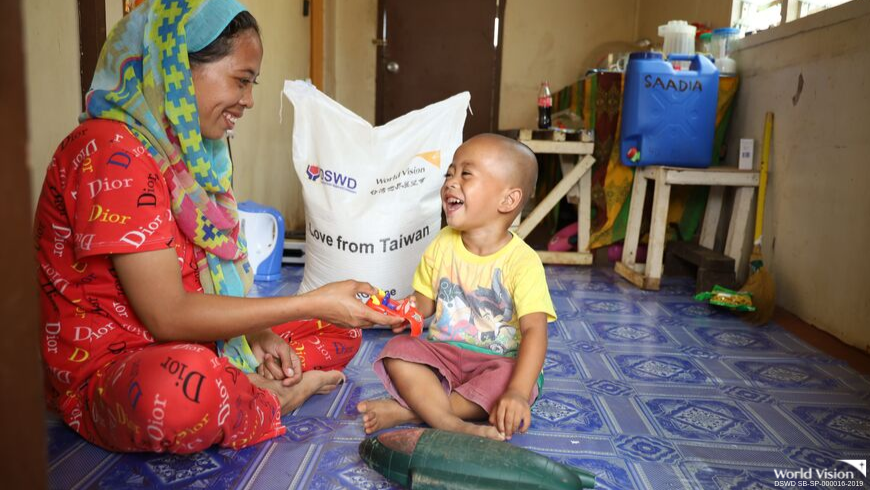Rice assistance to ease food burden of Marawi crisis-affected families
“It’s been a while since we received assistance. At least in the next days, we will not be thinking of where to find money to buy rice,” Saadia, 27, a mother of four, said in her firm Maranao voice.
Saadia is one of the initial batch of families who just received food assistance — a 30-kilogram sack of rice donated by Taiwan Government to the people of Marawi thru World Vision and the Department of Social Welfare and Development (DSWD) in Region 10. Taiwan government donated 66,000 sacks of rice to Marawi crisis-affected families. Aside from government agencies, World Vision is also supported by Wan Hai Lines for the said project.
The aftermath of the Marawi crisis
For two years, Saadia and her family have been living in a temporary shelter – a small, brick house with only a room, where life is doubly difficult. Many of the things inside, such as the bed mats and a few kitchen utensils came from donations. Though most things are provided, the families in her neighborhood are struggling to make ends meet.
“My husband has no work. I have no work. Most people here eat one or two times a day, sometimes none at all,” she added. At the time of the interview, Saadia’s husband, Hamza, 28, was out looking for food. “I am not sure if he will come back with one or none,” Saadia shared.
According to Saadia, it is not a common practice for Maranao to eat root crops or corn as alternative to rice, like what other people in other provinces do. “We don’t eat those. We are rice people. We would lend money from relatives just to buy rice,” she explained.
Saadia received Php73,000 from the government. “We bought a motorcycle but we still need Php20,000 to convert it to a tricycle. People here ride tricycle, not motorcycle like in other places. I couldn’t build a convenience store because almost all my neighbors here are doing that.” Looking around, most houses in temporary shelters are peddling canned goods and other packed food stuff. “Who would buy if all of you have stores?” she said.
Due to their situation, Saadia was forced to temporarily entrust her three sons to their relatives. Her second son, Anuwar, 2, currently lives with her. “He would sometimes asked about his brothers. I told him they are living with his aunt and grandmother. I miss my boys but what can I do? Life here is not for the children. My mother was texting me the other day, asking me for further support. I turned off my cellphone,” Saadia said, her voice trailed off. “I cannot offer any help because we also need it.” She said she would one day take her sons again when life becomes better.
Not forgotten
Last September 26, 2019, the DSWD Region 10 and World Vision distributed sacks of rice to the first batch of Marawi crisis-affected families living in temporary shelters. The 66,000 sacks of rice will remind the people of Marawi “…that they are not forgotten,” said the Philippine-based Taipei Economic and Cultural Office Director Jerry Cheng-an Chuang during the turnover ceremony.
The donated sacks of rice also support the Food Assistance Project of the Philippine government, which aims to alleviate food shortage and enhance access for food of affected families.
World Food Programmes December 2018 report shows that food gap remains at 73.30%. The social welfare department under the Bangon Marawi Comprehensive Rehabilitation and Recovery Program (BMCRRP) distributed cash grant of P73,000 (US$ 1,400) comprising of P20,000 ($ 385) for Livelihood Settlement Grants (LSG) and P53,000 ($ 1,019) for the Transitory Family Support Package (TFSP) to 15,615 families from the 24 Most Affected Areas (MAAs) but both DSWD and Task Force Bangon Marawi recognized that there is still a need for food support.
“It is nice to see people like them helping us. I don’t know where they are but I want them to know, maybe through this interview, that I am grateful for their help,” Saadia said.
Aside from rice distribution, World Vision is also doing peacebuilding initiatives in the area. To date, the organization’s multi-sector interventions have reached 48,000 individuals including 25,000 children affected by the Marawi Crisis.










